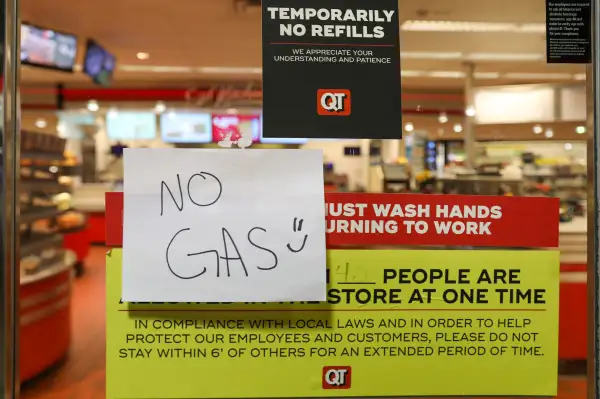3 Ways the Gas Shortage May Affect You (Even if You Aren't Waiting in Line for Gas)

The gas shortage rippling through the south and east coast is coming to a head, with panic-buying triggering price increases and empty pumps in states like Georgia and the Carolinas.
It started with a cyberattack: According to the Federal Bureau of Investigation, an organized crime group called DarkSide hijacked the computer system of Colonial Pipeline, a vital artery that runs 5,500 miles from Texas to New Jersey, forcing a shutdown starting May 8. All told, the outage might only last a few days—the pipeline's operator is expected to announce a timeline for restoring service on Wednesday—but experts interviewed by CNBC and other outlets predict the consequences could stretch into the weekend and beyond.
This could lead to a domino effect that, while temporary, might carry over to places outside of the pipeline's direct service area. Here's how.
Travel restrictions
Some U.S. airlines are running low on their supply of jet fuel. At least one, American Airlines, has added refueling stops to some long-haul flights, and is currently weighing whether or not to truck fuel into airports affected by the shortage, according to CNBC. Southwest Airlines, for its part, is filling planes traveling to Nashville and other affected areas with extra fuel to supplement local supplies.
If the pipeline is back up by Friday, U.S. air travel shouldn't be impacted much, energy experts tell the Hill. But if it lasts much longer, flights could get canceled, and ticket prices could skyrocket.
Same goes for Ubers and Lyfts. Rideshare apps are already facing historic driver shortages, and a bump in gas prices (which were already on the upswing before the Colonial Pipeline shutdown) would rocket fares even higher for people living—or traveling—in states directly impacted by the shutdown.
Toilet paper panic: round two
The trucking industry is also facing a driver shortage — which has impacted the delivery of groceries, household goods and other necessities since the start of the pandemic.
The Colonial Pipeline delivers about 45% of the East Coast's fuel, including gasoline, diesel fuel and jet fuel, according to AAA. The longer the shutdown, the longer it will take stores dotted along wide swaths of the country to restock shelves with peanut butter, toilet paper, and all the other goods that keep the country humming.
Yet another job crunch
A lot of small businesses, from landscapers to taco trucks, rely on a steady supply of gasoline to keep things running smoothly.
The people reportedly hoarding trunk loads of gas-filled canisters are drying up the supply for everybody, meaning these workers will be disproportionately impacted.
Since it will take more than two weeks for fuel to flow from Texas to New York once the pipeline is restored, according to AAA, today's panic buying could cause a ripple effect that lasts much longer than the shutdown itself. For south and east coast businesses already struggling to bounce back from the coronavirus recession, this is yet another kick in the teeth.
More from Money:
How to Lock in a Super Cheap Travel Deal Without Getting Scammed
People Are Wrapping Their Cars in Ads to Make Extra Cash. How Much Can You Really Earn?
Why You Need to Start Preparing Now for the Return of Student Loan Payments This Fall
